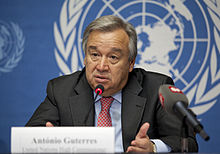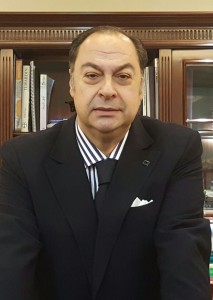

Your Excellency, Antonio Guterres:
The news out of Geneva is encouraging, offering hope that Cypriots might soon wake up from their decadeslong nightmare of division and hostility.
The potential of such a development – i.e. of a full and fair settlement that reunites the island nation’s ethnic Greek and Turkish communities for the first time since 1974 – reaches far beyond its own borders. As you yourself were quoted as saying Thursday, “We are facing so many situations of disasters. We badly need a symbol of hope. I strongly believe Cyprus be the symbol of hope at the beginning of 2017.”
Indeed, Cyprus matters – a lot, to many peoples, and for several reasons. The actual extent of symbolic value is notoriously difficult to determine, but the very demonstration that such a protracted conflict can be resolved through negotiations will buy credibility for diplomatic solutions wherever they are needed.
And that is not all, not by a long shot.
As you know, it has been determined beyond the shadow of a doubt that the Eastern Mediterranean contains world-class deposits of natural gas within the exclusive economic zones (EEZs) of several countries. This precious resource will not only generate revenues that allow regional governments to invest in education, health care and other social goods for their populations, but also provide Europe with greater energy security and lower costs that help restore its economic competitiveness.
Regardless of who ends up owning more or less of the deposits in question, Cyprus is destined to play a pivotal role that both accelerates the process by which benefits begin to flow and multiplies the positive impacts for producer and consumer nations alike.
Because of its physical location and geostrategic position, along with the often difficult relations among its neighbors, the island already qualifies as a powerful catalyst in several processes: as the most viable point of origin for a “Peace Pipe” that would carry the gas of several East Med countries to the European mainland and or to Turkey; as the most logical spot for a liquefied natural gas (LNG) plant whose output would reach customers in Europe and Asia by ship; and as the most convenient operational headquarters for everything from exploration and production to maintenance and telecommunications.
Of course, exploitation of this resource is inevitable to some extent. The gas is there, there is demand for it (especially from Europe, the world’s largest energy market), and there are no insurmountable obstacles to its extraction. Without a united Cyprus, however, the pace and scope of development will be substantially diminished. Cooperation with Turkey would remain difficult if not impossible, other regional players might judge it more prudent to build their own pipelines, and foreign investors would be less willing to invest in LNG and other capital-intensive facilities.
Excellency,
Just as a reunified Cyprus is a prerequisite for full and timely development of the region’s gas reserves, its rapid emergence as a regional energy hub can be the lifeblood of a new shared future for the island’s Greek and Turkish communities. The day-to-day work of reunification will continue long after the pageantry of any peace ceremony as homes and other properties are restored to original owners, displaced populations return to their towns and villages, and compensation is paid to qualified parties. The devil will remain very much in the details, patience will run short among people who have been waiting more than 40 years, and tempers will flare. With a lucrative gas sector growing up alongside this process, however, there will be both solid opportunities for intra-Cypriot cooperation and more financial resources available to smooth over the rough spots.
As you and others have recently stated, Cyprus is closer than ever to putting itself back together. Both President Nicos Anastasiades, who heads the internationally recognized Republic of Cyprus, and President Mustafa Akinci, leader of the breakaway Turkish Republic of Northern Cyprus, have expressed keen interest in – and even guarded optimism about – getting deal done sooner rather than later. What is more, a confluence of third-party interests, personalities and geopolitical developments is leading in the same direction. Turkish President Recep Tayyip Erdogan insists that he is committed to a settlement, Greek Prime Minister Alexis Tsipras has made Cyprus a top priority, and both Russian and American energy companies are invested in the Eastern Med, giving them a shared interest in regional stability that figures to extend to their respective governments. In addition, the incoming U.S. secretary of state, former ExxonMobil chief Rex Tillerson, is a veteran oilman who not only understands energy economics but also has cultivated good relations with Moscow.
Excellency,
Many key players already have entered the mix, including ExxonMobil, whose consortium with Qatar Petroleum, the world’s largest LNG producer, has secured exploration rights to the most attractive morsel in Cyprus’ recent third licensing round, Block 10 of its EEZ. Rosneft, one of Russia’s top three energy companies and half-owned by the Russian government, just acquired a stake in Egypt’s massive Zohr field, directly adjacent to the Cypriot zone. Then there is another Russian giant, Soyuzneftegaz, which has been granted extensive exploration rights just to the east of Cyprus in Syrian waters.
Given Moscow’s decisive role in helping the Syrian government to battle insurgents, and the fact that its only overseas naval base lies on Syria’s coast, never has it been closer to securing the position of strength in the Eastern Med that Russian statesmen have sought for centuries. American power has long stood in the way, but now the two countries have a shared interest in the region’s stability, and Tillerson’s boss, President-elect Donald Trump, has articulated a less confrontational vision of the relationship.
The diplomatic tea leaves are hopeful too. Anastasiades recently credited the Turks with pushing for an early resumption of talks, describing the prospect of access to Cypriot gas as a key consideration in Erdogan’s calculations. Akinci has voiced his belief that 2017 “can be made a year of peace and resolution.” And the U.N.’s own envoy, former Norwegian Foreign Minister Espen Barth Eide, said both sides “recognize that the status quo is unacceptable and unsustainable, and that the current talks offer the best opportunity for a solution.”
Excellency,
The benefits of Cyprus’ returning to the world stage as a nascent energy hub would flow to peoples across the Euro-Mediterranean region and beyond. Once other countries in the Eastern Med start producing gas in quantities sufficient for export, a stable and unified Cyprus will make it easier for them to reach customers in Europe and Asia, providing enough revenues for a veritable renaissance of the regional economy; Turkey and its European neighbors would be surer of meeting their energy needs, and therefore of rejuvenating their own economies; the removal of an ever-present disagreement also would provide space for a rapprochement between Turkey and Greece; and the whole neighborhood would gain from a return to normality, helping it to attract more tourists and investors, expand trade relationships and increase cooperation on everything from academic and cultural exchanges to civil aviation and maritime search and rescue.
And on the aforementioned symbolic level, what could be more conducive to remedying the problems of the Middle East than to teach Arabs and Israelis that peace and coexistence are not zero-sum games? That peace is both its own dividend and the source of many more to come? That this formula can be applied to just about any case of ethnic, national and/or religious dispute? That the futures of individuals, families and communities can be radically improved by sharing a land you love with someone you used to hate?
A lot depends on the principals, Akinci and Anastasiades, to make this happen. Many members of their respective constituencies subscribe to rival narratives, but most are tired of division, and while cobbling together a workable deal and selling it in two separate referenda will be demanding work, the payoff figures to be almost incalculable. But ultimately it is up to Turkey to allow the Cypriots to find a solution that suits them.
Add all of this up, and the momentum for peace has never been greater. The people of Cyprus need and deserve all the help they can get to make good on this potential, as do those of other countries and societies in need of reconciliation, as well as still others who desperately need affordable and reliable energy supplies. In short, whoever we are, we help ourselves by assisting the Cypriots. That’s why Cyprus matters.
Roudi Baroudi is CEO of Energy and Environment Holding, an independent consultancy based in Doha, Qatar.


